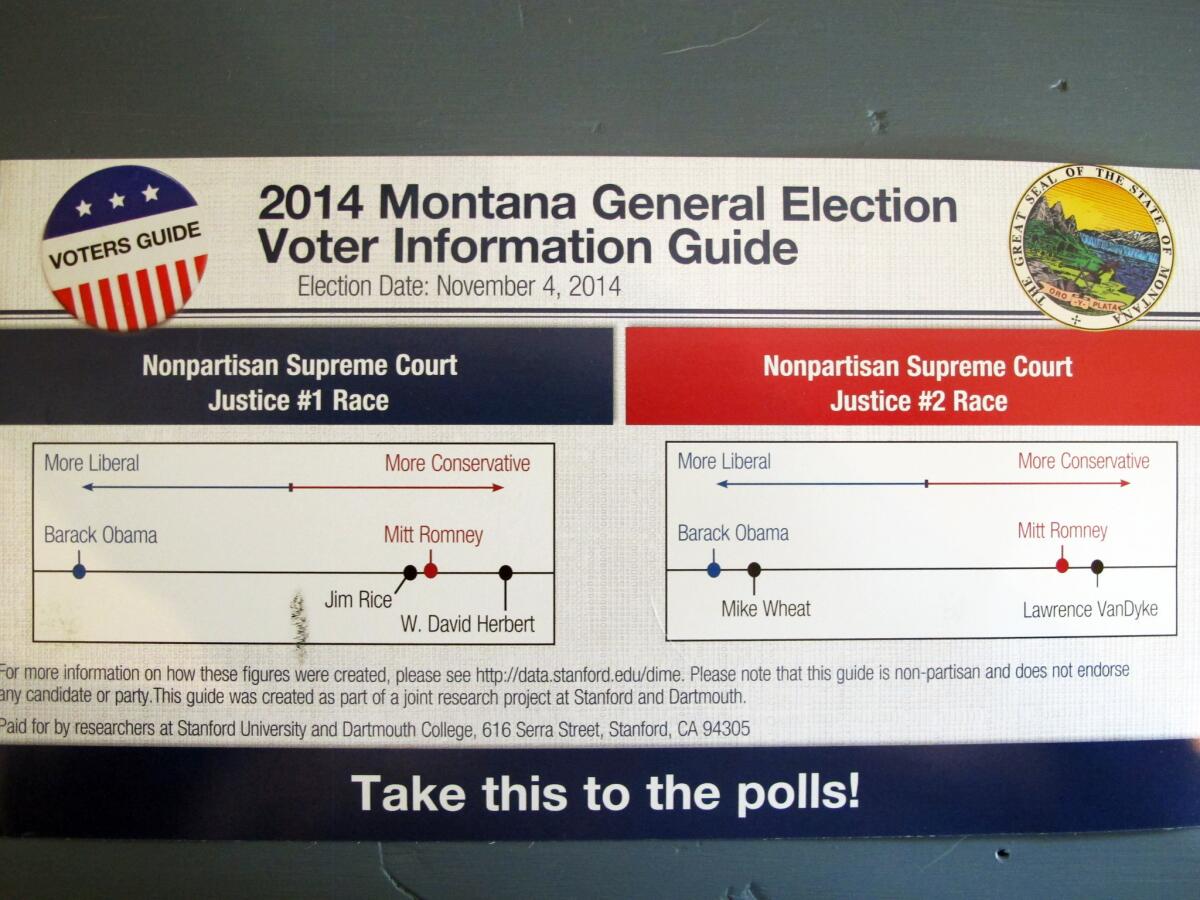Calif. voters among those getting mailers in controversial political study

Reporting from Sacramento — An unconventional voter guide -- part of a controversial political science study that caused an uproar in Montana -- also hit the mailboxes of nearly 150,000 Californians last week.
The mailers, which were sent out in two congressional districts by researchers at Stanford University and Dartmouth College, compare the ideologies of the area’s congressional candidates, as well as the contenders for the state superintendent of public instruction.
The candidates are described as “more liberal” or “more conservative” relative to President Obama and Mitt Romney, his GOP challenger in 2012. A Stanford spokeswoman said researchers determined the candidates’ ideological tilt by analyzing campaign finance data.
Mailers were sent in the 4th Congressional District, where Rep. Tom McClintock (R-Elk Grove) is being challenged by fellow Republican Art Moore, and in the 25th Congressional District, which pits state Sen. Stephen Knight (R-Palmdale) against former GOP state legislator Tony Strickland.
In both districts, the mailers also compared current Supt. Tom Torlakson and his challenger Marshall Tuck. Both are Democrats, although the position is nonpartisan.
In all, 143,000 mailers were sent out as part of the study, which “seeks to compare voter participation in precincts that receive the additional information with voter participation in precincts that do not,” said Stanford in a statement.
But the mailers have not been warmly received in Montana, where pamphlets were sent to 100,000 voters statewide with information on candidates in two state Supreme Court justice races.
Like the mailers in California, the Montana pamphlets were marked with an official state seal. Election officials in Montana said that could confuse voters into thinking the mailers were official communications from the state.
The Montana secretary of state filed a complaint last week that the mailers broke four state laws.
In California, there are laws against the misuse of the state seal. But Evan Goldberg, California’s chief deputy secretary of state, said that so far, no one in his office or in registrars in targeted districts have received a complaint or even seen a copy of the mailing.
“As soon as we can get our hands on the mailer, then we can determine what the next steps would be,” Goldberg said Monday.
McClintock’s campaign expressed concern that the mailers were a “serious violation of both state and federal laws and [we] expect that the appropriate authorities will investigate and prosecute accordingly.”
Cynara Lilly, spokesperson for Tuck’s campaign, said the campaign “certainly takes very seriously the idea that there may have been some kind of campaign malpractice. We’re waiting to learn more.”
Both schools said they are conducting investigations into the study, which also sent mailers to 66,000 voters in a New Hampshire congressional district.
On Tuesday, the presidents of Stanford and Dartmouth issued apologies to voters who received the mailers in California and Montana.
“We recognize that the purpose of elections is to enable our democratic systems to operate, and that no research study should risk disrupting an election,” wrote Philip Hanlon of Dartmouth and John Hennessy of Stanford. “We genuinely regret that it was sent and we ask voters to ignore the mailer.”
Follow @melmason for more on California government and politics.
More to Read
Sign up for Essential California
The most important California stories and recommendations in your inbox every morning.
You may occasionally receive promotional content from the Los Angeles Times.











